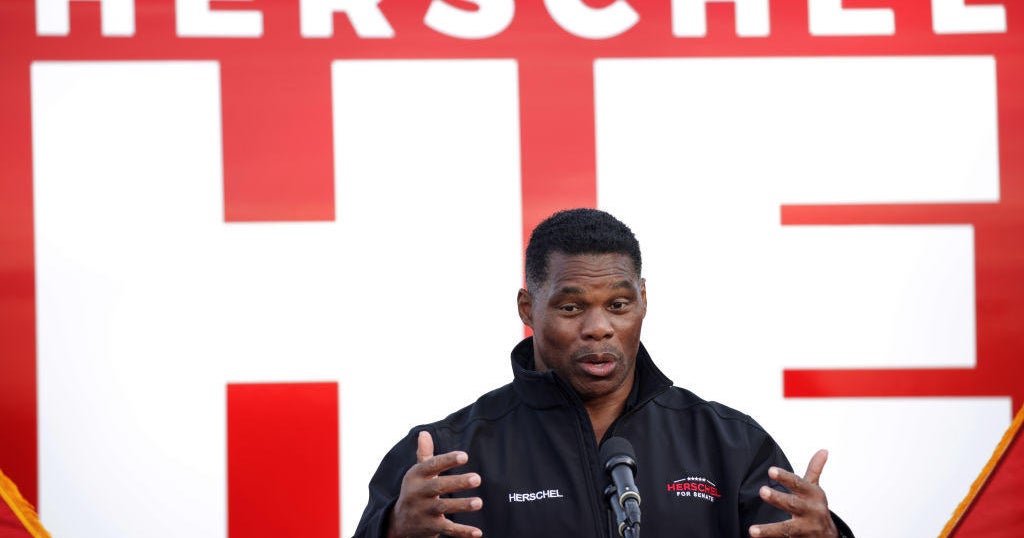CBS News
Why do Super Bowl tickets cost so much? Inside the world of NFL pricing, luxury packages, and ticket brokers with bags of cash

Nicholas Cù has been on the fence about buying a ticket to see his beloved San Francisco 49ers play in the 2024 Super Bowl on Sunday.
The lifelong fan has attended every 49ers playoff game for the last two years, but ticket prices this year are unrivaled by any football game in history, going for an average of more than $12,000 on some resale sites last week.
With just two days left until the big game, Cù was unsure Friday if he’ll ever get to attend a Super Bowl in person.
Cù asked a Facebook group of other 49ers faithful in January for “tips on the best and most affordable way to buy Super Bowl tickets.” The more than 100 replies that flooded in were emblematic of a well-known truth about the big game: it’s almost impossible for an average fan — or even a well-heeled one — to make it to the Super Bowl.
Nicoline Cu
Face-value tickets, which are expensive to begin with, are rarely made available to the general public.
It didn’t used to be this way. But in the last few years, ticket industry experts say, a series of business decisions made by the NFL for distributing the coveted tickets shot prices through the roof — far out of the reach of most fans.
Impossible to afford, by design
“It’s just a complete mystery how to even possibly attend without remortgaging your house to afford tickets,” said Cù.
That’s by design, according to Stephen Shapiro, associate chair of the University of South Carolina’s Department of Sport and Entertainment Management.
Some tickets are distributed to NFL teams, or sold at face value to players, coaches and others tied to the sport. Others are given to the league’s corporate sponsors and partners, such as CBS’ parent company, Paramount Global. (CBS is broadcasting the game; it will also air on Nickelodeon and stream on Paramount+.) Then another batch of tickets goes to an events company founded by the NFL in 2010 called On Location Experiences.
“There isn’t typically a general public opportunity,” Shapiro said. “Teams will have tickets that they can sell to season ticket holders, but even that’s a lottery system. And then between sponsors and hospitality and other corporate partnerships, tickets are pretty much spoken for.”
Driving costs up further is the size of the venue this year. Attendance at Las Vegas’ Allegiant Stadium is expected to be about 60,000 — among the smallest in Super Bowl history. By comparison, nearly 68,000 fans attended the 2023 game in Glendale, Arizona, and about 70,000 the year before, in Inglewood, California.
Face-value tickets usually cost anywhere from $950 for a nosebleed seat to $9,500 to be just behind the teams, overlooking the 50-yard line. That’s a fraction of what Super Bowl tickets are selling for online.
Other buyers have to settle for secondary market sites like StubHub or SeatGeek; ticket brokers — people who buy and sell tickets for a living; or high-end packages from the NFL’s “Official Hospitality Partner,” On Location.
The packages on On Location’s website this week ranged from around $7,000 to more than $60,000.
The NFL did not respond to emailed questions. A spokesperson for On Location declined to comment.
The NFL investment vehicle with a stake in the game
Nearly a dozen ticket brokers, sports management experts, academics and attorneys contacted by CBS News said the current structure makes it challenging for fans to get access — and drives up the cost.
“How does a $4,500 ticket become a $14,000 ticket?” asked one frustrated ticket broker, who agreed to speak with CBS News on an anonymous basis because he still does business with the league.
“It’s greed, just greed,” he said.
He and others pointed to On Location, which is allotted at least 11,000 tickets each year, according to ticket brokers and other sources familiar with doing business with the NFL, as a culprit driving these astronomical prices.
Before On Location became a factor, ticket brokers sometimes sold Super Bowl seats for just a few hundred dollars over face value, and some were arranging flights and hotels for fans to attend.
“I was making, in many cases, $50 or $100 over the face ticket value, but I was happy,” another ticket broker told CBS News.
NFL executives started an equity fund in 2013 called 32 Equity to invest in companies and deals on behalf of the teams, according to PitchBook, which tracks venture capital investments. Forbes’ 24th Annual NFL Team Valuations reported the firm’s investments drove the average net worth of each of the 32 NFL teams to $3.48 billion, according to Global Corporate Venturing. Because it is a private fund, 32 Equity is not required to disclose its finances.
32 Equity has typically invested in companies that work with the league, including the NFL’s data provider Genius Sports, retired NFL star Tom Brady’s brand TB12, the athlete recovery device company Hyperice, and software companies Appetize, Skillz, and Strivr, reported Front Office Sports.
It invested in and acquired On Location in 2015, according to PitchBook. On Location sells its tickets as part of packages that can run tens of thousands of dollars, and include perks like unlimited food and drinks during the game, hotel accommodations, live pre-game entertainment and what the company describes as “bucket list experiences.” Hotel rooms and other amenities associated with the Super Bowl are booked months in advance, with the company setting high prices as a test to see what the market can bear, multiple sources familiar with the pricing strategy told CBS News.
One leading broker defended On Location’s pricing.
“They’re trying to price a product within a fair market value,” said Ken Solky, president of LasVegasTickets.com and former president of the National Association of Ticket Brokers. “It’s their party and their tickets.”
Jeff Speer/Icon Sportswire via Getty Images
Columbia University professor of business Vicki Morwitz noted that ticket prices through resellers and brokers were dropping in the days leading up to the Super Bowl. She said these waves reflected the dynamic pricing model most ticket sellers use, in which prices go up and down based on demand. It’s a model that’s not always popular with customers, she said, pointing to complaints when high demand leads to high prices in other industries.
“Uber and Lyft let supply and demand decide everything about how a price is set, but in the eyes of the consumer, that economic reality of supply and demand doesn’t always match perceptions of fairness,” Morwitz said.
Shapiro, the sports marketing professor, said the guaranteed supply of tickets to sell, paired with blocks of hotel rooms and other amenities, creates “a competitive advantage for On Location,” which is now owned by the Endeavour Group — a multibillion-dollar global sports and entertainment company that NFL owners have a small minority stake in.
In January 2020, Endeavor Group Holdings, Inc. acquired On Location in a $660 million deal, according to the Hollywood Reporter. The NFL’s equity fund retained 13.5% ownership of the company, according to an SEC filing.
Endeavour CEO Ariel Emanuel said in a statement at the time that the company would “advance the way consumers and brands think about money-can’t-buy experiences.”
In 2022, the NFL’s investment arm bought back its equity in On Location. Executives exercised an option to retake close to 40% equity in the company, marketing Super Bowl LVI as On Location’s “single largest hospitality event of all time,” according to an annual investor pamphlet in an SEC filing.
Two months later, On Location became a wholly owned subsidiary of the talent agency, which converted the NFL owners’ stake in On Location to a 1.5% ownership share of Endeavor. The agency reported $1.344 billion in revenue in the last quarter of 2023.
Bags of cash, and secondary market secret deals
The NFL’s control of the Super Bowl ticket market has repercussions in the secondary ticket market.
That players, coaches and other staff receive and sell tickets is something of an open secret, according to brokers who spoke with CBS News.
One ticket broker called a CBS News reporter while driving in New York City with $85,000 in cash in his car that he said was to purchase Super Bowl tickets from an NFL employee. CBS News agreed to anonymity so the ticket broker could provide details on how the brokering system works.
Brokers said they often acquire tickets from people who’ve received them at face value and elected to sell them for profit: players, coaches, event sponsors, agents or their clients.
Many of these deals are conducted in cash, and it’s “not uncommon to bring one million dollars in cash” to the Super Bowl city to purchase tickets, said the broker.
The NFL started to crack down on these sales as its own hold on ticket sales grew. Every year it notifies employees that they are prohibited from selling their tickets.
“Coaches are petrified,” said one ticket broker — and they’re selling less, some brokers said.
This change has also had the effect of raising the pricing, brokers said.
“Let’s just say inevitably tickets are going to move, the tickets are going to travel some road. And inevitably, some of them are going to end up in the hands of upstanding brokers like LasVegasTickets.com,” Solky said.
Shapiro said the image of NFL personnel cashing in on the game doesn’t jibe with the NFL’s fan-friendly marketing.
“From a public perception perspective, I don’t think it would look good for the league if individuals that are associated with the league buy the tickets at face value and are just reselling them to make an obscene profit,” Shapiro said.
Even with the “obscene” markup, Nicholas Cù said he was still thinking about pulling the trigger.
“I’m in a position in life where I potentially could afford to purchase these tickets to go, given how much it means. But it’s just so high for three hours of entertainment,” Cù said.
“It’s just a small percentage of people that have the means and the access,” said Shapiro. “We’re talking about the one-percenters that get to go.”
CBS News
Trump taps Herschel Walker for ambassador to the Bahamas

President-elect Donald Trump announced he will nominate Herschel Walker, the former football player whose 2022 Senate run was plagued by controversy, to serve as U.S. ambassador to the Bahamas.
“Herschel has spent decades serving as an Ambassador to our Nation’s youth, our men and women in the Military, and athletes at home and abroad,” Trump said on social media Tuesday night.
Walker would need to be confirmed by the Senate to assume the role. The Senate has not confirmed a U.S. ambassador to the Bahamas in over a decade. Former President Barack Obama had nominated Cassandra Butts for the role in 2014, but the Senate never even brought her nomination up for a vote, according to The Associated Press. She died in 2016.
Trump in his first term nominated Doug Manchester in 2017 for the ambassador role, but his nomination stalled for over two years. CBS News in 2019 also uncovered evidence of a possible pay-to-play scheme for the role. He eventually withdrew and Trump went on to nominate William Douglass in 2020. Douglass’ nomination was withdrawn by President Biden when he took office, and Mr. Biden in turn nominated Calvin Smyre, who has not been confirmed by the Senate.
Absent an official ambassador to the Bahamas, Kimberly Furnish currently serves in the role of Chargé d’Affaires.
Walker rose to national prominence as a star running back for the Georgia Bulldogs, winning the Heisman trophy in 1982. He spent his first few years of professional ball in the United States Football League before it folded, and then moved on to the NFL.
Walker reentered the national spotlight when, at Trump’s urging, he challenged Georgia’s Democratic Senator Raphael Warnock for his seat in 2022. The race featured several controversies, including two women claiming that Walker — who was running as an anti-abortion candidate — had paid for them to get abortions.
Walker denied both allegations.
In one instance, Walker admitted to writing a check for a woman who said he paid for her to get an abortion in 2009, but he said he hadn’t known what the money was for.
Another woman claimed Walker paid her to get an abortion while the two carried out a six-year relationship while he was married to another woman and playing in the NFL. During a news conference back in 2022, she said she couldn’t go through with the procedure when she went to get it herself, so Walker took her to a clinic in the Dallas area the next day and waited for her while she got the abortion.
“This was a lie a week ago and it is a lie today,” Walker said at the time following an interview the woman gave a week after the initial news conference.
Warnock would go on to win the election in a runoff after neither candidate received more than 50% of the vote on election day.
Aaron Navarro and
contributed to this report.
CBS News
1 killed, 9 injured in mass shooting in Baltimore suburb of Towson, police say

BALTIMORE — One person was killed and nine others injured in a mass shooting in the Baltimore suburb of Towson Tuesday night, authorities said.
Law enforcement responded at around 7:15 p.m. in the 8500 block of Loch Raven Boulevard, Baltimore County Police Chief Robert McCullough said in a news briefing.
“It appears to be a mass shooting incident,” Baltimore County Police Chief Robert McCullough told reporters. “We have multiple persons who were shot. Right now, we are determining the circumstances and the conditions in this case.”
The first arriving officer found a vehicle on its side in flames, McCullough said, and then several gunshot victims were found in the area. The name of the person killed was not released, and the conditions of the nine people injured was unknown.
At this time, investigators believe this was an isolated and targeted incident, with no further threat to community at this point, he added. It’s unclear if any suspects have been arrested.
The Bureau of Alcohol, Tobacco, Firearms and Explosives is at the scene assisting police, as was the Baltimore County Fire Department.
Anyone with information is asked to call Baltimore County Police at 410-887-4636.
This is a developing story and will be updated.
CBS News
Can Democrats recapture the House in 2026?

Watch CBS News
Be the first to know
Get browser notifications for breaking news, live events, and exclusive reporting.










